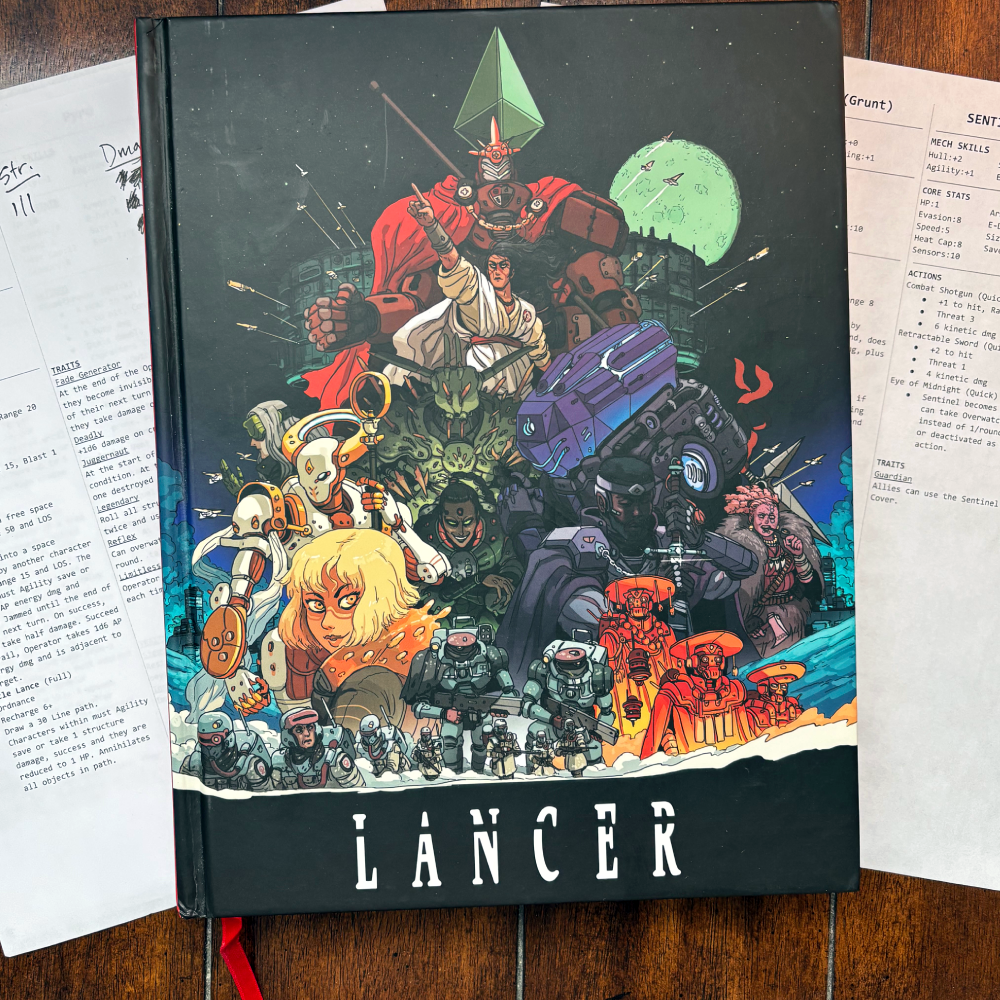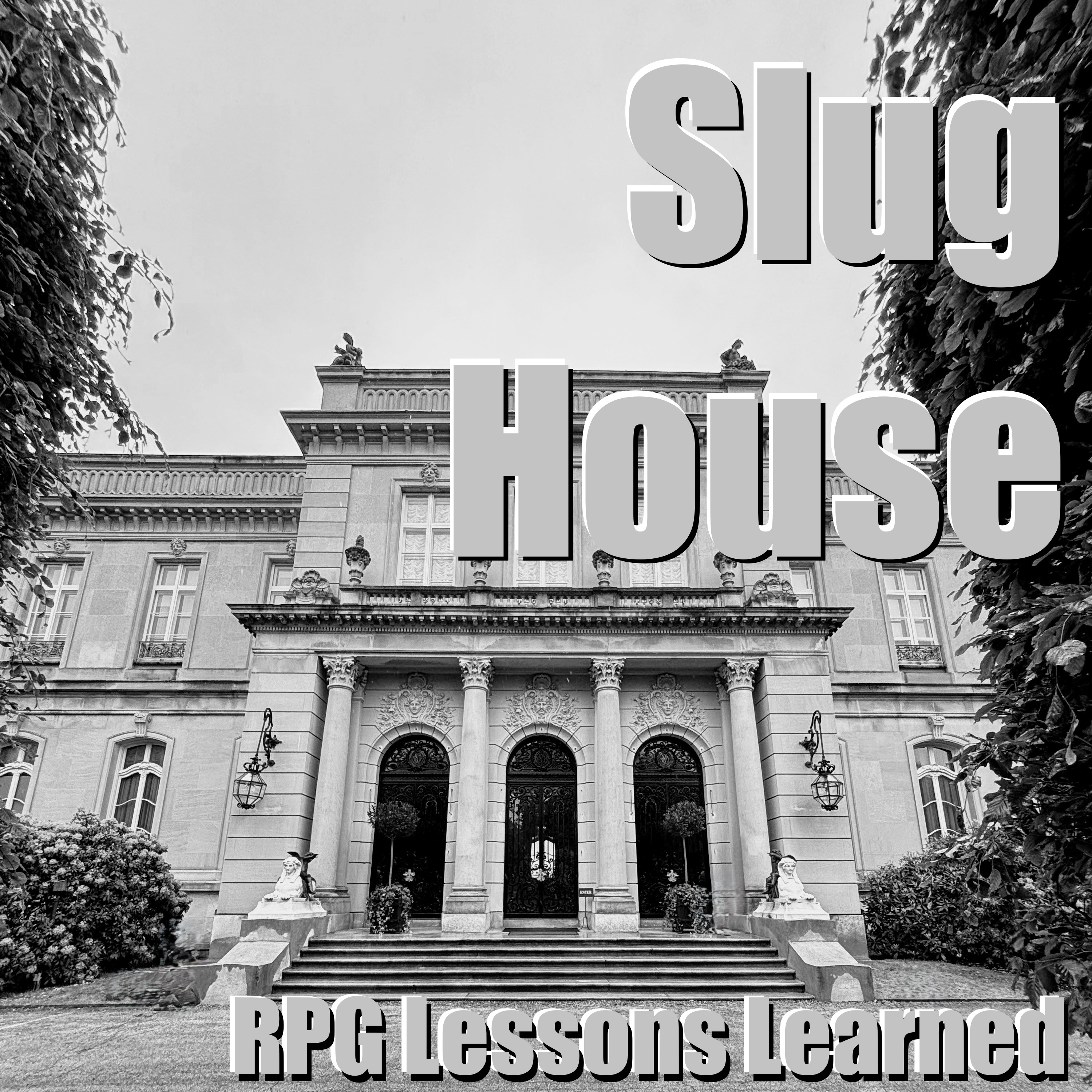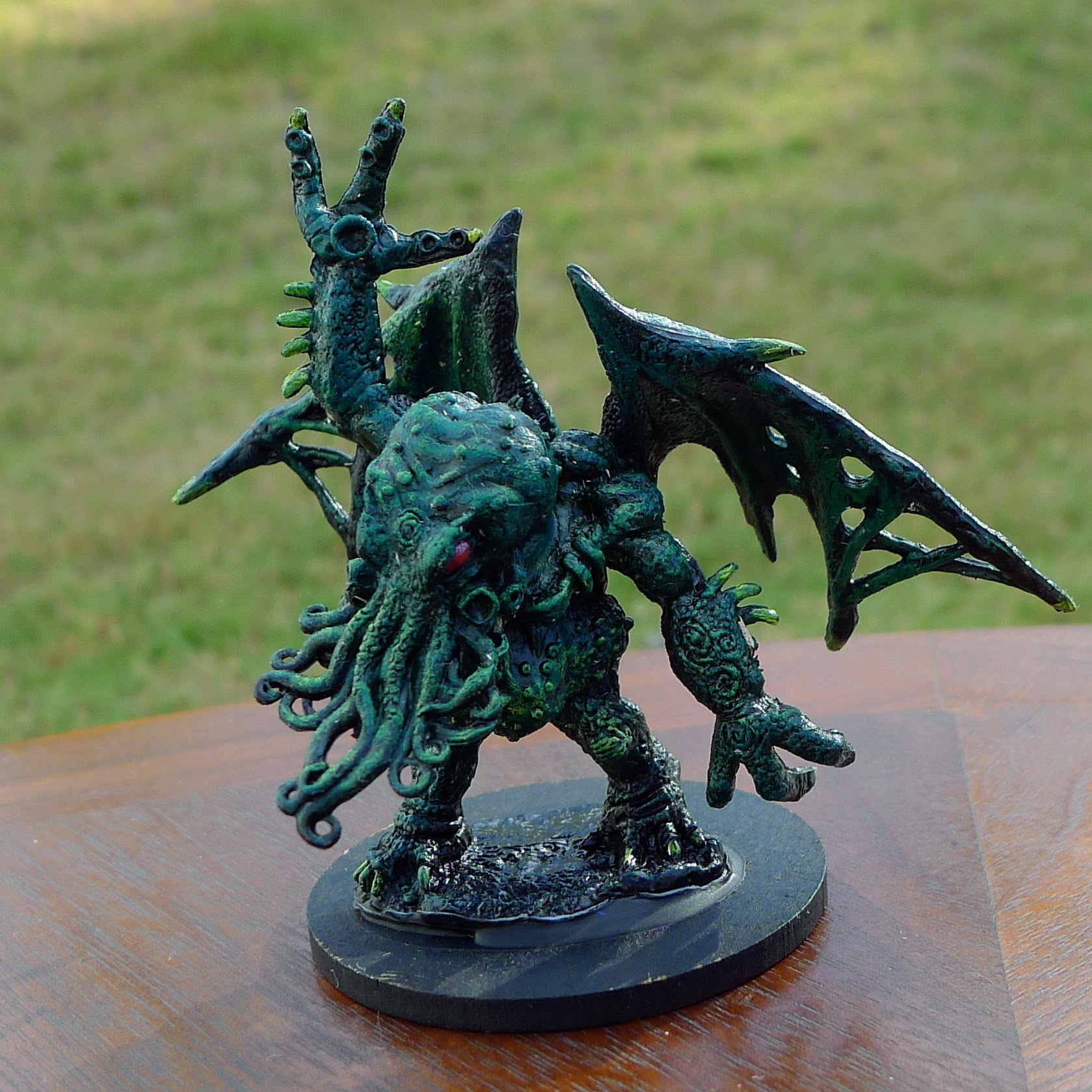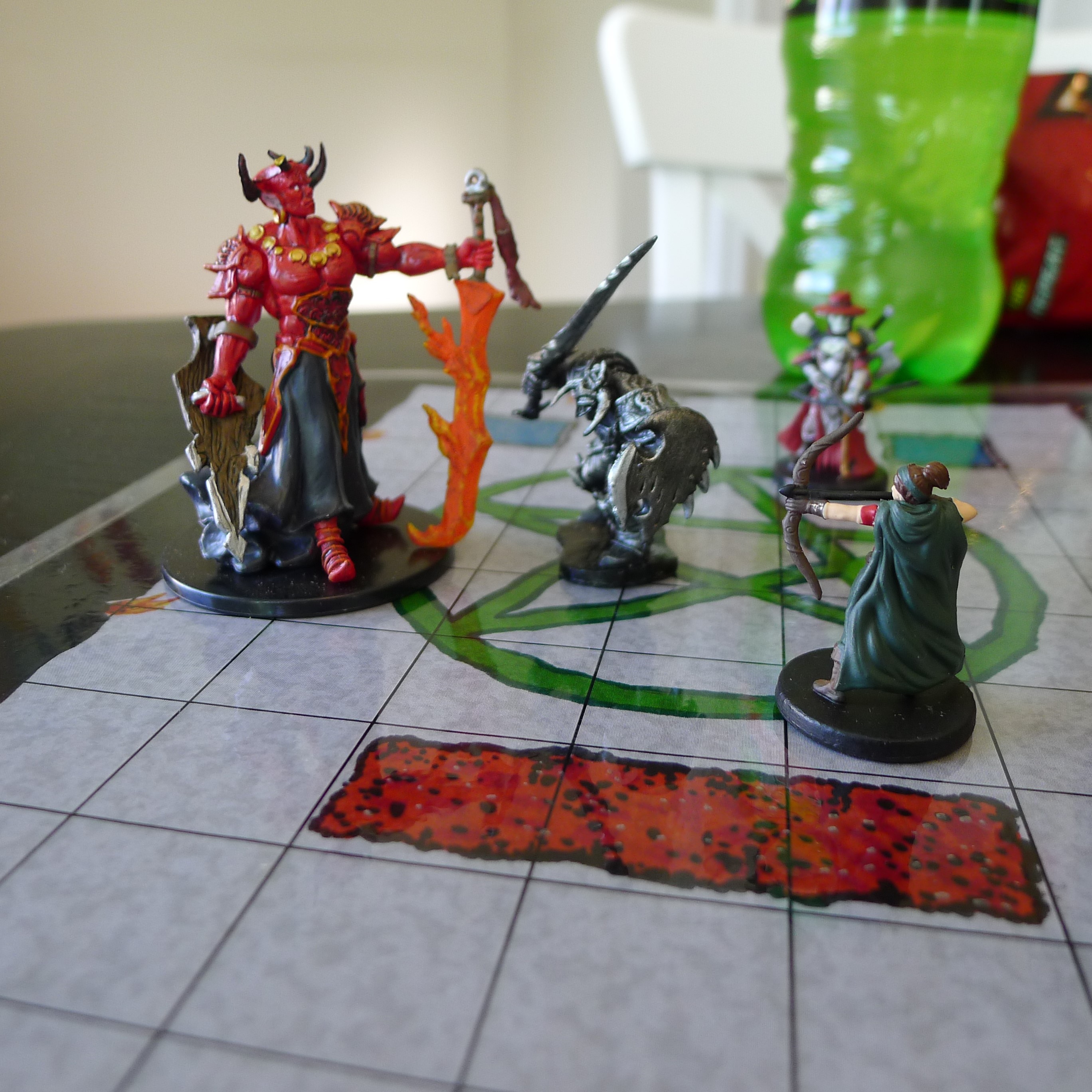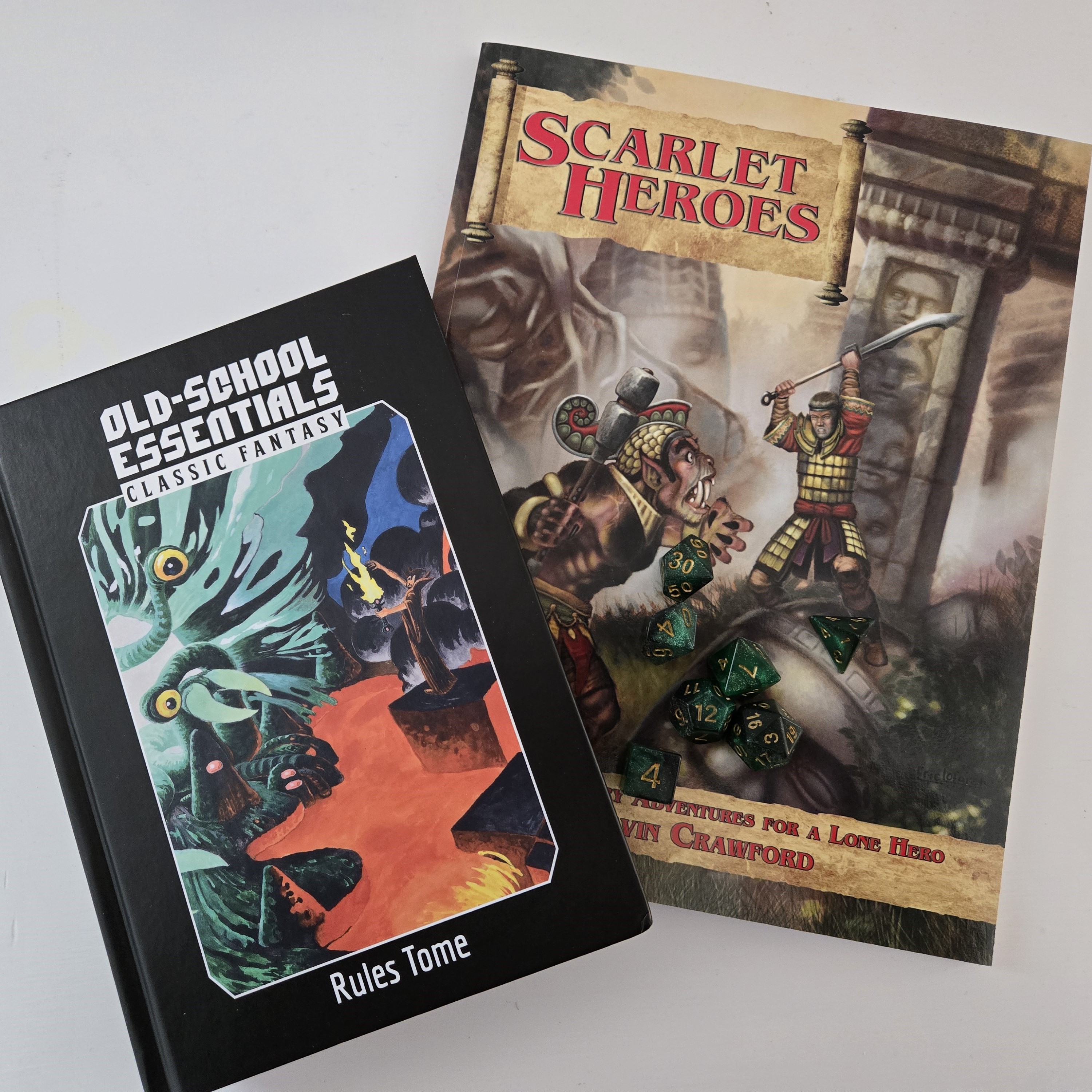[00:00:00] Speaker A: RPG Lessons Learned. When the game is over, when your players are gone, that's when lessons are learned.
Find us
[email protected].
email us at rpgllpodcastmail.com and find us on BlueSkyPGL.
Hi. Welcome to RPG Lessons Learned, the show where you can learn from our mistakes.
I'm Dusty and with me, as always, is Tanner. Hi, Tanner.
[00:00:32] Speaker B: Hey, Dusty. How's it been, man?
[00:00:34] Speaker A: It's been a while since we've talked. It's been almost two months.
I haven't gamed very much, uh, since we've talked. It's been a very busy time at work. But you have finished a campaign, sir?
[00:00:47] Speaker B: I have. I always feel like it's a little. I don't want to get morbid, but I don't know how many campaigns any of us have left in our life. So being able to tick one off, you know, it feels like a little medal or a little trophy I can put on the shelf and be proud of.
[00:01:00] Speaker A: I'm, um, delighted you brought that up. That will not affect how I sleep at all tonight.
So you finished your Lancer campaign?
[00:01:07] Speaker B: I did, yep. Playing.
Playing, uh, a game of Lancer online with a group of, um, local friends of mine. It's still, they're local to me, but it would be like 45 minutes for us all to get together on a weeknight. So I'm pretty sure I mentioned this before. We're all playing. We all played on roll 20. And yeah, by my math, I think we had a 10 session campaign, which is pretty fair. I think it's a pretty. Maybe some people would say it's pretty short, but for such a combat focused game, um, it was basically one half of it was an extended, um, pre written adventure and then the other half of it was all, uh, home brewed scenarios and stuff.
[00:01:54] Speaker A: So when last we talked. Let's, let's pick up right there.
Uh, when last we talked, I was giving you different ideas, suggestions. I don't actually remember what any of those were because for us in real time, it has been, um, probably three or four months.
How did you end the campaign? What were the last few sessions like?
[00:02:16] Speaker B: So the premise of where we were sort of at the end, um, and where we last talked was that the players were going into this extra dimensional cyberspace to get powers from an AI God to do their bidding on this planet. That they were invested in kind of overthrowing the negligent rulers of part of my writer's block with that was that this was in, uh, cyberspace and so, like, anything was possible. So I had to, like, kind of figure out what I wanted to do in terms of, like, the actual mechanics of the encounter to get these powers from this God. So I don't know if, uh. Like I said, I don't exactly remember what we talked about, but we talked about doing, like, a point crawl or, like, something along the lines of, like, resetting and, like, having to do an encounter over and over again until you get it right. And I did steal one idea from you, which was, um, putting the players in the minds and bodies of civilians trying to escape a mech attack.
And that, I think, was a big success.
Um, I basically assigned each player a character, and they were in this urban war zone where there were two Mechs attacking and they were trying to evacuate. And each player had, like, one skill that they could use to try to save as many people as they could.
And, um, my players, I don't know, they're not my usual group. They didn't, like, take it as super seriously, maybe as I intended, but at the same time, I think they all did like it. And it kind of leads into something that, um, that was interesting. So, like, I did this encounter, and then the AI said, this is what you people are like. This is what you're doing. How can you actually do this?
And I had a combat after that planned, but my players actually, like, talked their way out of it and convinced to me, to my satisfaction, this God to loan them the fleet for, um, for their own purposes.
[00:04:29] Speaker A: Nice. It sounds like probably the session before last. And then I assume the last session was them using the fleet.
[00:04:36] Speaker B: It was. So one of my players, his character, um, he wanted to, like, merge with a higher technological consciousness. So he had talked to me, and he's like. He basically accepted that he would become a vessel, a conduit for this God. And he talked to me out of character. He's like, I want my character to die this last session. And he's like, I'll leave you to, like, figure that out and stuff. But he's like, I want to sack. Like, I want this to be the end of my character's arc.
So what we did is we had a combat, a tactical combat at the start of the last session where, um, they were using the fleet to defend themselves against the evil empresses, um, forces. And my player who was playing is the character who, um, who wanted to sacrifice themselves. I told him, I said, okay, is. Is channeling and using his psychic powers to control the fleet. Everybody else is defending. And I said to Is as player. I said, here's a list of powers you can do. And he was basically playing the fleet instead of his character. And his character became m the objective of defend this character. And I gave him like a little mini game. I said, all right, here's like the fleet powers you can use.
Call down air strikes, orbital strikes, send in drones, all this cool stuff to keep him engaged, even though his player was sort of out of action.
[00:06:01] Speaker A: That's cool.
[00:06:02] Speaker B: Have you ever done something like that? Have you ever had a player wanting to sacrifice themselves for story reasons? Or like, have you ever tried to. Have you ever made a mini game within a combat? I guess as well?
[00:06:15] Speaker A: Yes, I've done both of those things. Uh, neither time it didn't go terribly well for me. One I talked about many, many, many, many episodes ago with the Halloween game where all the zombies were attacking the saloon. I shouldn't say saloon. I should say tavern. Tavern's the best word.
And Mike, his character, he was tired of playing his character and he wanted to sacrifice his character. Like, have a different character. A different character class.
[00:06:41] Speaker B: Yeah.
[00:06:41] Speaker A: And secretly we were like, let's make your character the bad guy. And at a certain moment you'll reveal.
And I kind of telegraphed to the other players and I thought to him that he was about to switch and he didn't get it. And they did. And they all attacked him and killed him.
[00:06:56] Speaker B: Oh, uh.
[00:06:57] Speaker A: And it's like, oh, that. That. That betrayal arc didn't go the way we wanted because he was going to reveal himself to be like a necromancer the whole time.
[00:07:04] Speaker B: Yeah.
[00:07:05] Speaker A: So he wanted to sacrifice himself. That didn't go great. And then I've played combats with. With minigames, basically.
Uh, I had a. Well, that just kept spawning kobolds. Four kobolds every turn until you figured out how to stop it.
But the kobolds just overwhelmed the players before they could figure out the things to stop the kobolds.
[00:07:26] Speaker B: Yeah, yeah, it's hard. I mean, like, you're doing a piece of game design on the fly, really. Maybe not on the fly. Like you have a chance to kind of think about it. But mine didn't go super great either. Like, the story moment was great because it is basically got confronted by the people of this planet and are saying, like, you're just going to be another ruler to us. Like, you're coming in here with a cudgel to beat us at a submission. Like, yeah, sure, you're gonna knock off the person at the top, but what guarantee do you have that. We're not gonna just be oppressed by you Next. And he had the fleet destroy itself above the planet, like, self destruct as a sign of, like, I'm here to. To. As a scalpel to take out the old and then to give up my power. And that moment, I think, narratively worked really well. And we had talked kind of vaguely about that.
The thing with the. The powers. Basically, I had him. I said, okay, here's a list of powers. Each one of them costs a certain number of points and does a different thing. Like, oh, deal. 2d6 damage to this space or mark target.
Basically kind of like a hunter's mark type effect on everybody on the map. And these each had different point values. And I had him just roll a D6 at the start of each turn to determine how many points he had, and he could spend them, um, however he wanted while talking, you know, with a party to. To strategize. I gave him too, Too few points. Like, he. I wanted there to be decisions about it. But, like, I think we had like two or three rounds in a row where he got like a one or a two, and he's like, well, I, uh, guess I do this. And I'm like, well, crap. Like, that's not what I wanted this to. To feel like. So I don't feel super bad about that because, like, I don't know how I would have detected that unless I play tested it. You know what I mean? Like, in retrospect, sure, it could have been a D8 or, like a D6 plus 2, but I don't know. That's. That's pretty tough to figure out.
[00:09:29] Speaker A: It is, yeah. Maybe a D6 and a D4 and you keep the highest.
[00:09:33] Speaker B: Something like that. Like, to at least give you some sort of normalization to it. But anyway, so after that, we had that big tactical combat. Uh, and then I said, all right, you are going to be infiltrating the Empress's palace on foot. And you are. We're going to end the story that way. And we played the rules of Lancer outside the Mechs for the finale. Basically, the way that Lancer works is that you have, like, skills. They're called triggers in Lancer, and you roll a D20 and you add your trigger if it happens to apply, and you're trying to get a 10, and that's it. I am free to, like, give advantage or disadvantage.
Um, but still, that makes you pretty broadly capable. Like, all my players had triggers that were like, between plus two and plus six. So like they had around a 75 chance to succeed at something. They were good.
And we just. I made a point crawl and I said, all right, here's where you enter the palace. Here are all the different locations. Each location is going to have a challenge. You can either overcome the challenge with roles or you can go back another way and try and do this. So I ran kind of this montage infiltration of the palace and my players said that was their favorite part of the whole game.
[00:10:53] Speaker A: The whole game meaning the whole campaign.
[00:10:56] Speaker B: I. So we, we had a little diagnostic, a little RPG lessons learned moment after. And I said, what worked for this campaign, what didn't? And they said I loved all the parts when it was free form and we were just rolling skills to try and get where we wanted.
Wow.
Yeah. So that gobsmacked me a little bit. And like none of them said like they all said about the tactical combats. They're like, they were all good.
They appreciated that they never had a combat with the same objective twice. Which I consider that to be a pretty big win for myself considering there were ten sessions of four E style tactical combats. And I kept it fresh. They're like, it was all good, but they're like they felt energized by the. The freeform stuff.
Wow. Yeah.
[00:11:42] Speaker A: You know, I almost don't know what to say about that. It mirrors my experience with 4th edition where we'd have these amazing combats and these dynamic environments with these dynamic enemies. I mean unparalleled, bar none, 4th edition was an incredible miniat skirmish war game. It was absolutely purpose built for that.
[00:12:05] Speaker B: As is Lancer in in its similarities.
[00:12:08] Speaker A: But it's funny how the players are like now the fun parts when we just weren't doing what the system was intended to do.
[00:12:14] Speaker B: And it's like, what are we doing? Why are we talking about systems? The players don't care. Dusty. It felt like, I don't know, like the man behind the curtain got revealed or something.
The only thing I can say to that is I wonder my theory, and maybe this is me coping, that there are two types of fun. There's moment to moment fun and there is, I'll remember this part of the game in 10 years fun.
I think moment to moment combat is fun. It is fun to be like, oh, I'll. I'm getting a flank on this guy. I can use this as a piece of COVID Oh, if you use this power, I can use this power on my turn. Like my players were all engaged and they were all doing that But I think that that type of fun is so ephemeral and leaves your mind as soon as you're out of the combat situation.
Do you think there's any truth to this, um, theory of mine? And then the broader story stuff, I roll the dice to swinging on a chandelier, like, that's the stuff that people remember and talk about their game five years from now.
[00:13:15] Speaker A: I think you're right. I think that's hugely insightful. In a dungeon crawl, we forget the fun of I roll the Senate doors.
Oh, yeah, okay. Oh, I hear some guys. Oh, what do we do, guys? Let's take the hinges off. Like, you won't remember those parts because it's all very mechanical. It's, um. Someone once said old school. D and D is a game about doors.
[00:13:38] Speaker B: Interesting.
[00:13:38] Speaker A: Um, and I don't think you remember all the doors, but you'll remember the 10 minutes of figuring out what to do with the door. You'll forget, but you'll remember the 15 minutes of killing the kobolds. Or the two minutes, if it's a surprise round of surprising the kobolds on the other side of the door and, like, taking them out.
So, no, I think you're screwing over.
[00:13:59] Speaker B: The mayor when he tries to undercut you or something like that. Like, I think players really like having big swings that affect the world. And I think combat is 100 tiny swings that affect the world. And in there, only really, when you look at any single role in combat, you accomplish way less than you do outside of combat with a role generally.
[00:14:24] Speaker A: Yeah. And that's. I think it's true with any procedure, is what I'm trying to say. It's like the procedure of combat, the procedure of dungeon crawling. The procedure is fun in the moment, but you forget that the procedure is fun, but you remember the moments the procedures create.
[00:14:37] Speaker B: Yeah.
And then, uh, we kind of ended the session with, um, my players narrating sort of what happened to their characters.
By the way, I will say I had. After Iz's character sacrificed himself, I had him play another NPC during this infiltration. And I said, here's this character. Here's her. The three things she's good at, yada, yada, yada. And she was a character that the. The players already knew. So I did keep the player looped in. I didn't just have is this player sit around and do nothing for the second half of the session, which is what I was kind of worried about, like, when he talked about wanting to sacrifice himself. So I did prepare for that and had him engaged as a player throughout the whole rest of the thing. And I got to basically, um, have my players narrate their epilogues. And, like, one of my players, like, set up plot points for the next campaign, if we ever pick this up, which was awesome. Like, I love my. That m. My players were like, like dropping little plot nuggets of and like, ending their character story on a cliffhanger for next time. So, you know, whether we ever explore that or not, who knows? But my players were engaged with the story of it, and I think that that was the biggest win.
[00:15:53] Speaker A: That's awesome.
Did you ask them for numeric ratings 1 to 10?
[00:15:58] Speaker B: Oh, I didn't. I. I think everyone felt like a 7 to 8 range, which I think is. Is pretty good. At least if I had to sort of pick up what. What they were putting down, that's what I would. Would have guessed. But, yeah, so that it was just a big shocker to learn that. Like, man, what were we playing this tactical game for? And I think a lot of my players, they came to me and they said, hey, this game sounds cool. I want to play it. Will you run it? And I said, yes, I already own it. I'll run it. So I think a lot of them maybe didn't quite know what they were getting into with Lancer, or, um, were drawn in by one aspect of it and maybe didn't consider the super tactical aspect of it. But they said that the worst part of the game was that it felt like two games, and me as the gm, was trying to glue those two parts of the game together with a story each time.
Yeah. Yeah. And, uh, we had one session without combat, and they liked that one too. And we kind of talked about. I'm like, me as the gm, I said, yeah, like, basically trying to figure out a reason to have a tactical combat. Every session or most sessions was, like, really tricky. And there's only certain types of stories you can tell with that. You know what I mean?
[00:17:20] Speaker A: That feedback about two systems that are glued together takes me right back to 4th edition as well. There's all the stuff that's on the grid, and then there's all the stuff that's like, skill checks and skill challenges, and they're just. They feel very different.
[00:17:36] Speaker B: Yeah. And I don't mind on paper, the idea of, like, a game having two sides to it. You know what I mean? Plenty of games have two sides to it. Like, um, Like a lot of Gumshoe games. Like, here's the investigation, here's the Downtime.
Um, D D is like that, like there's downtime rules for stuff. Here's adventuring rules. So, like, I don't quite know how to disentangle or like what to learn from this. You know what I mean? Because like, on paper, the fact that, yeah, the role playing stuff should not be as crunchy as the mech stuff, I would agree with that.
That being said, they made it that way and I look at it and something is still off. You know what I mean?
[00:18:15] Speaker A: I do. So the $64,000 question before we go to lessons learned.
Would you play Lancer again?
And if so, how would you run it differently so that you had fun with it?
[00:18:28] Speaker B: I would 100% run it again. I had a fun time coming up with stories in this sci fi world. It's a very interesting.
I had fun once I figured out like my proclivities for how I like to run combat. I loved being able to reskin enemies and give this enemy a new power and like, I felt engaged as a gm, uh, the whole time in combat in a fun way, not in a bookkeepy way.
I would run it again.
I would run it from the start as a more player driven thing. I think the first half of the campaign being slightly on rails and working for the man, I don't think it did us any favors. I guess it was good to like learn the system and be able to understand, like, why certain things of the game work and like give us some structure. But the story wasn't there for us with this, with this one. The overall narrative investment was pretty low on it. So I would do like a very big session zero and say, who are your characters? Why are they working together? What kind of missions do you have?
Okay, I can prepare for that one session at a time ahead of time, like I did in the back half of this game. So I would basically skip the preamble now that I know how to play it and get to the good stuff.
[00:19:51] Speaker A: And I think the lesson learned is the huge insight you had about the two kinds of fun.
Have you thought of a kind, uh, of pithy, short way to sum that up as a lesson learned?
[00:20:02] Speaker B: Maybe there's a difference between short term fun and long term fun. Short term fun is the bean counting at the table. It's getting, arguing with the GM to get a plus two. If I stand in this tile as opposed to the one over, it's oh, I can use my power with your power.
But that stuff is so ephemeral and it tends to leave the mind and session to session, long term, two weeks down the road, a month down the road, five years down the road. What you're going to remember are the big sweeping changes. The moment where the mayor tried to screw you over and you screwed him back over. Or the time where you kicked down the door and all the kobolds were asleep and you killed them all. Like, those type of moments are going to be the memorable ones. And I guess you just have to make sure your game has both types of fun, because you can't have short term fun if your game is all short term fun. It's, I guess it's engaging at the time, but it kind of feels like empty calories almost.
But if all you have is long term fun, then it's like, well, what are me and you doing at the table right now? You know what I mean? So, I don't know. I would like to ponder, uh, upon this because I kind of came to this realization at the same time as I was talking about it. So I definitely want to think about this a little bit more. And if you, as the listener, have any, uh, ideas about that or can elaborate on that or anything else, feel free to let us know because we're kind of trying to figure this out too.
[00:21:30] Speaker A: Absolutely. Uh, RPG llpodcastmail.com and, uh, RPGL podcast on Blue Sky. Well, thank you all for listening. And Tanner, I'm going to go deal with the existential crisis you created when you pointed out we don't know how many campaigns we have left at us.
[00:21:48] Speaker B: I think I have two D8 plus three left.
[00:21:51] Speaker A: Oh.
People call them reviews, postmortems, retrospectives.
We call them lessons learned, and we're sharing ours with you.
